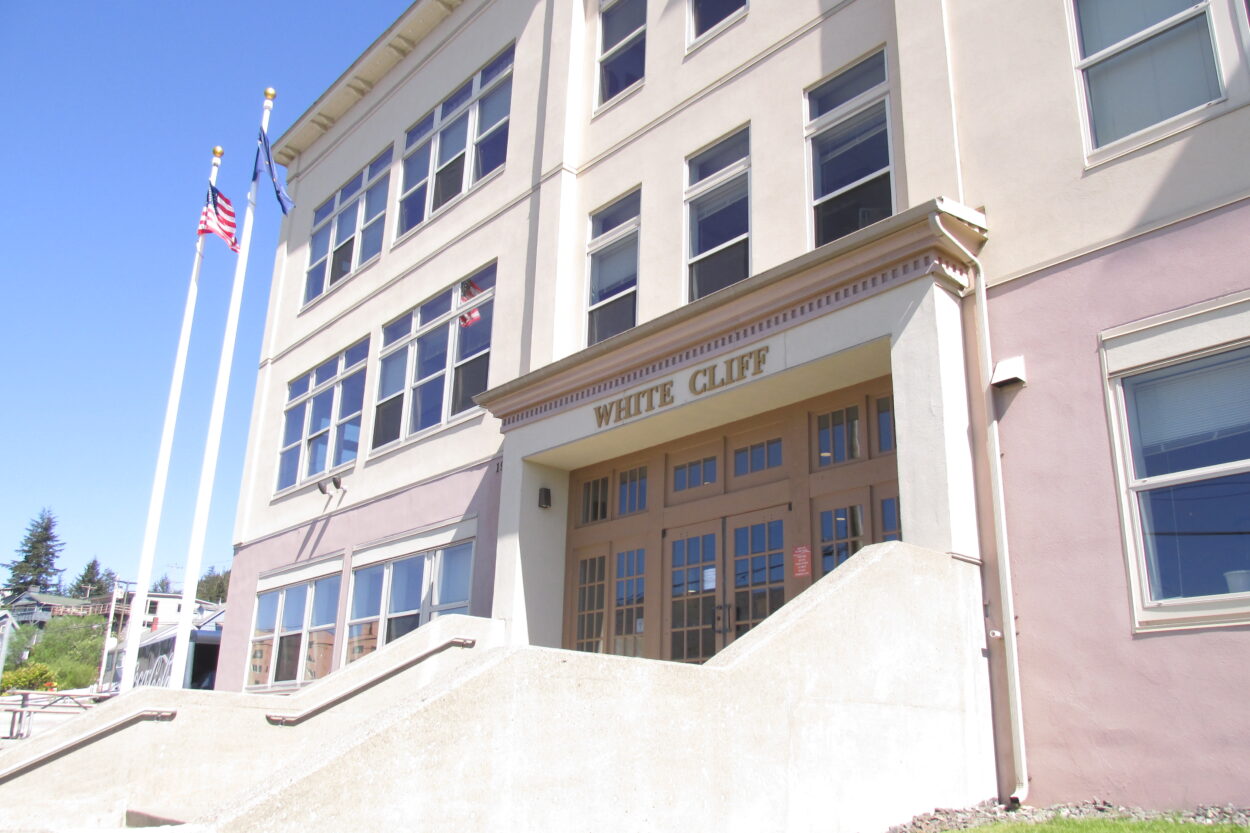
Ketchikan’s borough offices are in the White Cliff Building, seen here on a sunny day in 2020. (Maria Dudzak/KRBD)
Ketchikan’s borough will seek cash from a national settlement over the opioid epidemic. For now, it’s unclear how much the borough could receive from the settlements, but local officials say it likely won’t be enough for Ketchikan to fund treatment centers or other programs aimed at curbing the use of addictive drugs.
Alaska is one of all but eight states to join the settlement agreement with drugmaker Johnson & Johnson and three drug distributors: AmerisourceBergen, McKesson and Cardinal Health. The companies have offered $26 billion to settle some 3,000 lawsuits from states and local governments alleging the companies oversupplied opioid drugs, leading to an explosion in overdose deaths.
Now, municipalities across the country have until Jan. 2 to join the settlement. Borough Attorney Glenn Brown told Ketchikan’s Borough Assembly on Monday that a lot was up in the air — some $10.6 billion of that settlement will only be paid if enough localities sign on — but he said Alaska was likely to receive nearly $60 million over 18 years. Brown estimates about $8.7 million would go to nine local governments eligible to join the settlement, including Anchorage, Juneau, Fairbanks’ city and borough, Kodiak, the Mat-Su Borough, Wasilla, the Kenai Peninsula Borough and the Ketchikan Gateway Borough.
“Long story short, for the borough right now, at the 15% going to municipalities and a rough distribution within the state based on population, it’s not a giant amount of money. It’s really somewhere in the neighborhood of $10,000 to $11,000 a year,” Brown said.
Brown said the percentages aren’t set in stone — negotiations with the state could raise the share for municipalities to as much as half of the total.
“It’s crude math — I’m taking payments over varying terms — but it would average then somewhere in the neighborhood of $36,000 a year, far short of what we would ever need here to be able to produce a facility, to run a facility, let alone staff it,” Brown said.
He said five rural municipalities, including Ketchikan’s borough, were in early talks about pooling their shares of the settlement to provide a single facility.
At least 70% of the total amount sent to the state must be spent directly on the opioid crisis. Brown said state officials had also floated the possibility of holding some of the funds in an endowment, a la the Permanent Fund or the Alaska Mental Health Trust, to ensure that funding for addiction treatment doesn’t run out at the end of the 18-year settlement term.
Ketchikan Borough Assembly members voted unanimously to approve joining the settlement. Assembly Member Jeremy Bynum applauded the move.
“Although this isn’t a large sum of money, I think it is a recognition of a step in the right direction. It also gives us an opportunity to have these conversations about what our needs really are,” Bynum said.
Any municipality that joins the settlement forfeits its right to sue Johnson & Johnson and the three distributors over the opioid crisis. But Brown says future payouts from other manufacturers and retailers might be on the horizon. Payments could begin as early as April 2022.
Disclosure: Borough Attorney Glenn Brown is a member of KRBD’s nonprofit board of directors, which does not direct news coverage.





